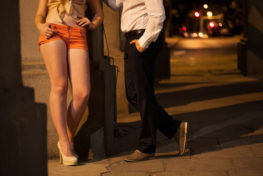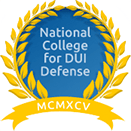
Another common charge related to prostitution is loitering for purposes of engaging in prostitution. If you are facing a prostitution loitering offense, a conviction will result in a disorderly persons conviction. While this is not a felony under New Jersey law, it nevertheless results in a misdemeanor criminal record. Our attorneys frequently obtain a downgrade and/or dismissal of loitering for the purpose of prostitution charges so it would be in your best interest to explore assistance from our office. To this end, we are available 24/7 for free initial consultation at 862-203-4070.
Passaic County Prostitution Defense Lawyers
New Jersey Loitering for Prostitution Law: N.J.S.A. 2C:34-1.1
The law that applies to this offense is contained at N.J.S.A. 2C:34-1.1. This criminal law provides as follows:
2C:34-1.1. Loitering for the purpose of engaging in prostitution
3. a. As used in this section, “public place” means any place to which the public has access, including but not limited to any public street, sidewalk, bridge, alley, plaza, park, boardwalk, driveway, parking lot or transportation facility, public library or the doorways and entrance ways to any building which fronts on any of the aforesaid places, or a motor vehicle in or on any such place.
b. A person commits a disorderly persons offense if he:
(1) wanders, remains or prowls in a public place with the purpose of engaging in prostitution or promoting prostitution as defined in N.J.S.2C:34-1; and
(2) engages in conduct that, under the circumstances, manifests a purpose to engage in prostitution or promoting prostitution as defined in N.J.S.2C:34-1.
c. Conduct that may, where warranted under the circumstances, be deemed adequate to manifest a purpose to engage in prostitution or promoting prostitution includes, but is not limited to, conduct such as the following:
(1) Repeatedly beckoning to or stopping pedestrians or motorists in a public place;
(2) Repeatedly attempting to stop, or repeatedly attempting to engage passers-by in conversation;
(3) Repeatedly stopping or attempting to stop motor vehicles.
d. The element described in paragraph (1) of subsection b. of this section may not be established solely by proof that the actor engaged in the conduct that is used to satisfy the element described in paragraph (2) of subsection b. of this section.
In order to establish a violation of 2C:34-1.1., the prosecutor is required to prove that the defendant “wandered, remained, or prowled” in a public place with the purpose of engaging in prostitution or promoting prostitution. The State is also required to show some conduct, committed by the Defendant, that displays a purpose to engage in prostitution. This behavior can be displayed by evidence that the Defendant was on a street corner (or other public place) and was repeatedly attempting to stop passing motorists. Even if the required conduct can be proven, it must also be established that the Defendant was in a public place, such as a street, sidewalk, building entryway, etc.
Penalties for Prostitution
In addition to a record, a conviction results in a jail term that can reach six (6) months, a fine of $1,000, probation, and other consequences in the discretion of the court.
Prostitution Defense Attorneys in Passaic City NJ
An attorney from our office is available now to assist you further at 862-203-4070. We have been representing clients charged with soliciting prostitution in Passaic County, in towns like Wayne, Little Falls, Hawthorne, Totowa, Haledon, Prospect Park, Ringwood and Passaic City for over a decade. Call now for a free initial consultation.








